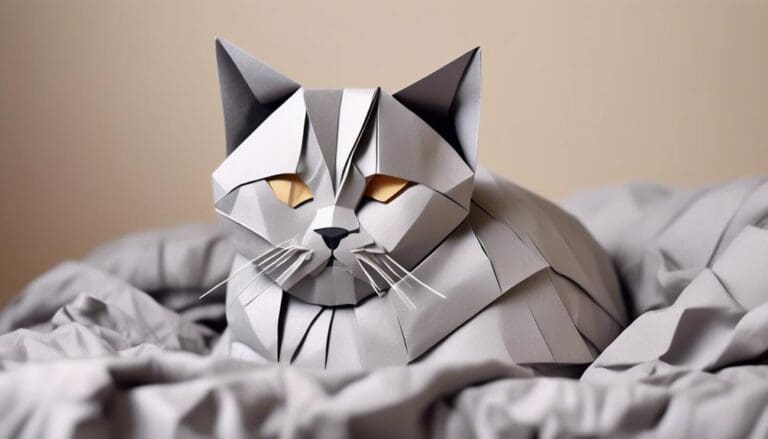As your cat ages, it will become less energetic and more calm. It’s very important to focus on keeping them comfortable and healthy, particularly regarding their sleep.
You’re already doing a fantastic job caring for your cat, but there might be a few more stones to turn over in pursuit of their perfect night’s slumber. Simple adjustments to their sleeping environment can make a world of difference, like ensuring their bed is as inviting as a warm lap. From the softness of their resting spot to the rhythm of their nightly routine, every detail can help soothe their older bones.
To help your older cat sleep better, consider using these caring methods to improve their rest. These tips are designed to help your cat have peaceful and restorative sleep.
Key Takeaways
- Regular vet visits are important for early detection of aging signs and adjusting their care.
- Establishing a sleep routine with a fixed bedtime and wake-up time can help normalize their internal clock.
- Orthopedic bedding can greatly improve sleep quality and joint health for aging cats.
- Maintaining warm temperatures and providing heated cat beds can help alleviate discomfort for senior cats.
Recognize Aging Signs
As your beloved cat enters their senior years, you might notice subtle changes in their mobility, such as a hesitant jump or a slower rise from their cozy napping spot. Aging can gently reshape how senior cats sleep and move. You can help them handle these changes smoothly.
Keep a watchful eye for signs like an altered gait or stiffness after resting. These could be whispers of arthritis or other health concerns that often come with age. It’s not just their movement—look for shifts in behavior too. If they show increased aggression, less enthusiasm for play, or have started avoiding their litter box, these are clues that they’re trying to tell you something about their comfort and well-being.
Regular vet visits are crucial to recognize aging signs early and to adjust their care to maintain sleep quality. Consider adding creature comforts like ramps for easier access to favorite perches, heated beds for soothing achy joints, or soft night lights to guide them after dusk.
Establish a Sleep Routine
Creating a consistent bedtime routine can work wonders for your aging cat’s sleep quality, ensuring they rest well throughout their twilight years. By establishing a sleep routine, you’re providing the structure to help them sleep better, addressing the changes in sleeping patterns that come with age.
Consider these gentle steps to guide your senior cat into restful nights:
- Regulate their schedule: Set a fixed bedtime and wake-up time to normalize their internal clock.
- Calming activities: Engage in quiet play or a soothing brush session before bed to help them wind down.
- Comfortable environment: Make sure their sleeping area is snug, quiet, and safe, fostering an inviting space for older cats sleeping soundly.
- Night-time navigation: A soft night light can ease their anxiety and prevent disorientation, aiding in better sleep.
Choose Orthopedic Bedding
Beyond establishing a sleep routine, selecting the right bedding, such as an orthopedic bed, can significantly enhance your senior cat’s sleep quality and joint health. Orthopedic bedding provides a haven of relief for your aging cat for those suffering from arthritis and other chronic conditions that cause joint stiffness and discomfort.
Consider how an orthopedic bed, with its specialized design, can cradle your cat’s delicate frame, reducing pressure on sore joints and promoting a deeper, more restorative sleep. It’s not just a bed; it’s a form of gentle, loving care that acknowledges the aches that can come with age.
For your senior cat, the added cushioning can make all the difference. Cats suffering from arthritis will find particular comfort in the supportive embrace of orthopedic bedding. You’re investing in your cat’s ability to rest better, which can lead to improved mobility and a brighter disposition.
Maintain Warm Temperatures
To ensure your senior cat stays cozy and pain-free, it’s crucial to maintain warm temperatures in their resting areas, particularly during the chillier months. As your cat ages, their ability to help regulate their own body temperature may diminish, making them more sensitive to the cold.
By creating a warm environment, you’re not only offering comfort but also promoting their well-being and potentially easing any discomfort associated with aging joints.
Consider these gentle measures to keep your senior cat snug and secure:
- Ensure Draft-Free Resting Spots: Find a spot away from doors and windows where drafts can sneak in. Your cat’s bed should be a haven of warmth.
- Heated Cat Beds: Invest in a safe, heated cat bed that can provide constant warm temperatures, which is especially soothing for sore muscles.
- Low Heat Sources: Keep a radiator on low or use a heating pad on a low setting under their cat beds to create a gentle warmth they can settle into.
- Accessible Comfort: Place additional cat beds on the floor in various rooms to ensure they’ve a warm spot to rest, no matter where they choose to spend their time.
Your tender care can make a significant difference in the quality of life for your senior cat.
Reduce Nighttime Noise
As your cat enters their senior years, reducing nighttime noise becomes essential for their uninterrupted slumber and overall comfort. Ensuring peaceful nights can significantly reduce stress and anxiety for your senior cat, helping to maintain a regular sleep cycle. Creating a quiet space where they can rest without disturbances will show your beloved pet just how much you care.
Here’s a simple guide to help you organize a serene environment for your aging cat:
| Strategy | Goal | Implementation |
|---|---|---|
| Minimize Ambient Noise | Create a tranquil atmosphere | Close windows and doors at night |
| Comfortable Sleep Area | Reduce disturbances from the household | Place bed away from noisy appliances |
| Noise-Canceling Solutions | Drown out external sounds | Use white noise machines or ear covers |
Encourage Evening Play
While ensuring a quiet environment for nighttime rest, consider the benefits of gentle play in the evening to help your aging cat wind down and enjoy a deeper sleep. As cats grow older, their sleeping patterns can change, and incorporating a playful routine before bedtime may lead to more restful nights.
Remember, senior cats may have mobility issues, so it’s important to tailor play that’s safe and enjoyable for them.
Here are some ideas to gently engage your older cat in the evening:
- Use interactive toys like feather wands that allow your cat to swat and chase at a comfortable pace.
- A laser pointer can provide mental stimulation as they ‘hunt’ the elusive dot, but always finish with a tangible toy to prevent frustration.
- Simulate hunting games by hiding treats around the house, encouraging your cat to seek them out.
- Offer puzzle toys that reward with treats, combining play with a tasty incentive.
Address Health Issues
As your beloved cat grows older, it’s essential to keep up with regular vet check-ups to catch and manage any health issues that could be disturbing their sleep.
Your vet can help you explore pain management strategies and dietary adjustments that may improve your cat’s quality of rest.
Vet Check-ups Essential
Regular vet check-ups are crucial for catching and managing health issues that may arise as your cat grows older. As cats age, they experience changes in their health that can affect their comfort and sleep quality. It’s important to be proactive about their well-being.
- Schedule regular veterinary exams to stay ahead of any health concerns.
- Ask for blood work and X-rays to keep a close eye on your cat’s health.
- Early detection and treatment are vital for your cat’s quality of life.
- Discuss pain management and dental problems with your vet to ensure your cat remains comfortable.
Pain Management Strategies
Addressing pain in your aging cat not only improves their comfort but can significantly enhance the quality of their sleep. Consulting with a veterinarian is vital for pain management strategies tailored to your cat’s body and health needs. They can suggest safe use of supplements like melatonin, which may ease discomfort and help your cat find better sleep.
Be cautious and never give human medications without professional advice, as they can be harmful.
To help reduce stress if they’re suffering from mobility issues, consider placing additional floor beds for easy access. A nightlight can guide cats with vision loss, ensuring they find their way and feel secure at night.
Dietary Health Considerations
While managing your cat’s pain is a step towards better sleep, ensuring they eat right plays a crucial role in their overall well-being and nighttime comfort. Your cat’s dietary health considerations are pivotal to help older cats maintain their health.
Here are some thoughtful ways to nurture them through their diet:
- Address specific health issues with vet-recommended diets, such as kidney-friendly or diabetic formulas.
- Offer balanced senior cat food that supports urinary health and helps manage weight.
- Include omega-3 supplements to nourish their joints, aiding in restful sleep.
- Keep their food and water bowls accessible and monitor hydration to prevent any conditions that could affect a cat’s comfort at night.
Provide Accessible Litter Boxes
To ensure your aging cat continues to sleep soundly, it’s essential to provide litter boxes that are easily accessible and cater to their changing mobility needs. As your senior cat grows older, its environment can make a significant difference in its comfort and wellbeing. Accessible litter boxes help keep your cat’s routine uncomplicated and stress-free, contributing to a good night’s sleep.
Consider the placement and design of the litter boxes. A quiet corner that’s easy to reach can encourage your cat to maintain good litter habits. Remember, a clean litter box also matters greatly in making your cat feel at ease.
Here’s a simple guide to help you create a welcoming litter box environment:
| Feature | Benefit |
|---|---|
| Low-sided | Enables easy entry and exit |
| Multiple locations | Reduces the need to travel far |
| Quiet area | Minimizes stress and disturbance |
| Regular cleaning | Maintains hygiene, preventing aversion |
| Accessibility | Ensures comfort and ease of use |
Limit Evening Meals
Ensuring your cat has an accessible litter box contributes greatly to their nightly comfort, and similarly, a well-timed, light evening meal can help prevent restlessness and hunger pangs that might disrupt their sleep. As your Senior Cat ages, their digestive system may not be as robust as it once was, making it essential to rethink their feeding schedule for a good night’s sleep.
Here are a few tips to ensure your beloved cat enjoys restful sleep each night:
- Offer a Small Meal: A modest portion in the evening will satisfy their hunger without overloading their digestive system.
- Time it Right: Serve their dinner a few hours before bedtime to allow enough time for digestion.
- Keep it Light: Choose a meal that’s easily digestible and won’t sit heavily in their stomach.
- Consult a Vet: Get advice on the best evening meal options tailored for your aging cat’s needs.
Create Safe Hideaways
Creating cozy hideaways for your aging cat can significantly ease their anxiety and enhance their sleep quality. As your senior cat becomes more sensitive to their surroundings, providing safe hideaways where your cat sleeps can make a significant difference in their overall well-being. As cats age, they tend to sleep more and crave secure spots where they feel protected.
Consider setting up igloo-style beds or simple cardboard boxes in quiet corners. These retreats offer your beloved pet a secluded area to rest, away from the hustle and bustle of daily life. To further tailor your cat’s environment to their comfort, limit their nighttime roaming to one or two familiar rooms. This can help them feel more in control and less overwhelmed.
If your cat has favored high spots they can no longer reach easily, place ramps or footstools to assist them. Also, a heated cat bed or a warm spot near a radiator can be incredibly soothing in colder weather.
To create an even more serene atmosphere, try using synthetic pheromone diffusers. These can help mimic the feeling of a safe, stress-free environment, encouraging relaxation and a peaceful slumber for your aging cat.
Frequently Asked Questions
Why Won’t My Senior Cat Sleep at Night?
Your senior cat’s night may be as restless as a stormy sea due to common age-related issues. Gently address potential health concerns and create a serene haven to encourage peaceful slumber.
How Much Should a 15 Year Old Cat Sleep?
Your 15-year-old cat should naturally sleep a lot, often up to 20 hours a day. Don’t worry—it’s typical for their age. Ensure they’re comfortable, and cherish the quiet moments you share together.
How Do You Calm an Older Cat at Night?
You’re easing your cat into peaceful nights, not just seeking silence. Gently warm their bed, play soft music, and stay consistent with bedtime routines. Their comfort mirrors your care, reflecting a serene bond.
How Many Hours Should a Senior Cat Sleep?
Your senior cat should naturally sleep up to 20 hours daily. If they’re resting peacefully and seem healthy, that’s normal. Always ensure they’re comfortable, and check with your vet for any sleep changes.




